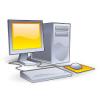I need help with the Windows XP Disc Defragmenter. It’s showing many red fragments remaining after running for very short intervals.
This is my first post. I did search, but didn't find any posts that seemed to be handling a defragmentation like mine which is running so quickly, but not defragmenting much.
After running both the Windows Disk Cleaner I ran the Disk Defragmenter on volume (C:) for 8 consecutive runs. Each time analysis is run, the message “You should defrag this volume” is displayed. Each time the Defragment is run the message, “Some files on this volume could not be defragmented. You should defragment this volume” is displayed. The running times were 60 seconds, 30 seconds, 20 seconds, 18 seconds, 20 seconds, 18 seconds, 17 seconds and 17 seconds.
I'm running VIPRE Antivirus in the background. It doesn't seem to make any difference if I shut it off.
Figures 1 through 4 display the progression of the 8 defragmentations.
Any help would be appreciated.
Thanks,
Mac2011
Figure 1 – Display before any defragmentation
Sorry! I couldn't figure out how to upload the screenshot of the Disk Defragmenter display.
It has about 150 red vertical fragments that I could distinguish.
Figure 2 – Report after the 1st defragmentation
************************************************************************************************************************
Volume Root Disk (C:)
Volume size = 54.53 GB
Cluster size = 4 KB
Used space = 37.91 GB
Free space = 16.62 GB
Percent free space = 30 %
Volume fragmentation
Total fragmentation = 13 %
File fragmentation = 22 %
Free space fragmentation = 4 %
File fragmentation
Total files = 102,252
Average file size = 1 MB
Total fragmented files = 16
Total excess fragments = 254,758
Average fragments per file = 3.49
Pagefile fragmentation
Pagefile size = 768 MB
Total fragments = 15,743
Folder fragmentation
Total folders = 13,850
Fragmented folders = 5
Excess folder fragments = 10
Master File Table (MFT) fragmentation
Total MFT size = 145 MB
MFT record count = 119,363
Percent MFT in use = 80 %
Total MFT fragments = 470
--------------------------------------------------------------------------------
Fragments File Size Files that cannot be defragmented
2 76 bytes \Application\PantryAccess2002411Date11162007STLuke'sSVDPDatabaseProgram02A\BuildInfo\BuildChanges\Build409TestingDate1012007
12 39 MB \Program Files\Sunbelt Software\VIPRE\Definitions\cblk.vtd
588 41 MB \System Volume Information\_restore{B37680B2-BA0A-4E5D-BF30-83E44C588624}\RP2569\snapshot\_REGISTRY_MACHINE_SOFTWARE
1,744 111 MB \WINDOWS\Microsoft.NET\Framework\v4.0.30319\SetupCache\Client\netfx_core.mzz
1,594 113 MB \Documents and Settings\All Users\Application Data\Adobe\Setup\{AC76BA86-7AD7-1033-7B44-AA0000000001}\Data1.cab
2,824 176 MB \System Volume Information\_restore{B37680B2-BA0A-4E5D-BF30-83E44C588624}\RP2568\A0242238.out
2,862 179 MB \System Volume Information\_restore{B37680B2-BA0A-4E5D-BF30-83E44C588624}\RP2568\A0242291.out
13 179 MB \System Volume Information\_restore{B37680B2-BA0A-4E5D-BF30-83E44C588624}\RP2569\A0242350.out
918 180 MB \Documents and Settings\Tom\Application Data\Real\RealPlayer\WatchFolders\fldrscan.out
45,896 2.81 GB \System Volume Information\_restore{B37680B2-BA0A-4E5D-BF30-83E44C588624}\RP2568\A0242242.out
46,151 2.82 GB \System Volume Information\_restore{B37680B2-BA0A-4E5D-BF30-83E44C588624}\RP2568\A0242286.out
22,747 2.83 GB \System Volume Information\_restore{B37680B2-BA0A-4E5D-BF30-83E44C588624}\RP2569\A0242351.out
61,502 2.83 GB \Documents and Settings\Tom\Application Data\Real\RealPlayer\WatchFolders\fldrscan2.out
52,079 3.18 GB \Program Files\Microsoft AntiSpyware\errors.log
************************************************************************************************************************
Figure 3 – Display after the 8th defragmentation showing little reduction in fragments
Sorry! I couldn't figure out how to upload the screenshot of the Disk Defragmenter display.
It has about 150 red vertical fragments that I could distinguish.
Figure 4 – Report after the 8th defragmentation showing little reduction in fragments
**************************************************************************************************************
Volume Root Disk (C:)
Volume size = 54.53 GB
Cluster size = 4 KB
Used space = 37.91 GB
Free space = 16.62 GB
Percent free space = 30 %
Volume fragmentation
Total fragmentation = 13 %
File fragmentation = 22 %
Free space fragmentation = 4 %
File fragmentation
Total files = 102,270
Average file size = 1 MB
Total fragmented files = 16
Total excess fragments = 254,774
Average fragments per file = 3.49
Pagefile fragmentation
Pagefile size = 768 MB
Total fragments = 15,743
Folder fragmentation
Total folders = 13,850
Fragmented folders = 5
Excess folder fragments = 10
Master File Table (MFT) fragmentation
Total MFT size = 145 MB
MFT record count = 119,381
Percent MFT in use = 80 %
Total MFT fragments = 470
--------------------------------------------------------------------------------
Fragments File Size Files that cannot be defragmented
2 76 bytes \Application\PantryAccess2002411Date11162007STLuke'sSVDPDatabaseProgram02A\BuildInfo\BuildChanges\Build409TestingDate1012007
12 39 MB \Program Files\Sunbelt Software\VIPRE\Definitions\cblk.vtd
588 41 MB \System Volume Information\_restore{B37680B2-BA0A-4E5D-BF30-83E44C588624}\RP2569\snapshot\_REGISTRY_MACHINE_SOFTWARE
1,744 111 MB \WINDOWS\Microsoft.NET\Framework\v4.0.30319\SetupCache\Client\netfx_core.mzz
1,594 113 MB \Documents and Settings\All Users\Application Data\Adobe\Setup\{AC76BA86-7AD7-1033-7B44-AA0000000001}\Data1.cab
2,824 176 MB \System Volume Information\_restore{B37680B2-BA0A-4E5D-BF30-83E44C588624}\RP2568\A0242238.out
2,862 179 MB \System Volume Information\_restore{B37680B2-BA0A-4E5D-BF30-83E44C588624}\RP2568\A0242291.out
13 179 MB \System Volume Information\_restore{B37680B2-BA0A-4E5D-BF30-83E44C588624}\RP2569\A0242350.out
918 180 MB \Documents and Settings\Tom\Application Data\Real\RealPlayer\WatchFolders\fldrscan.out
45,896 2.81 GB \System Volume Information\_restore{B37680B2-BA0A-4E5D-BF30-83E44C588624}\RP2568\A0242242.out
46,151 2.82 GB \System Volume Information\_restore{B37680B2-BA0A-4E5D-BF30-83E44C588624}\RP2568\A0242286.out
22,747 2.83 GB \System Volume Information\_restore{B37680B2-BA0A-4E5D-BF30-83E44C588624}\RP2569\A0242351.out
61,518 2.83 GB \Documents and Settings\Tom\Application Data\Real\RealPlayer\WatchFolders\fldrscan2.out
52,079 3.18 GB \Program Files\Microsoft AntiSpyware\errors.log
***********************************************************************************************************************
End of question



















 Sign In
Sign In Create Account
Create Account

